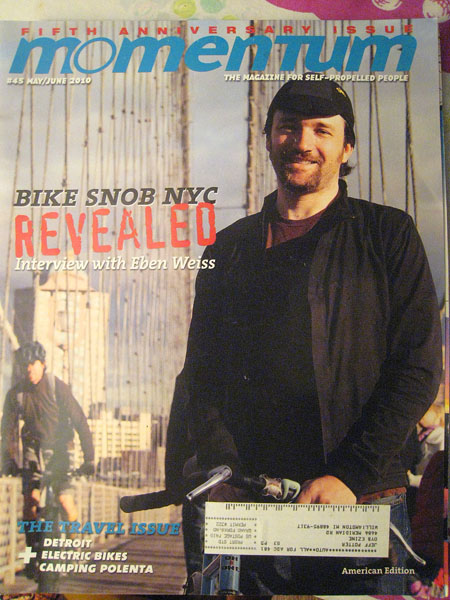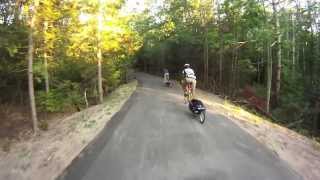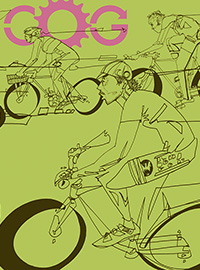Bikesmanship
by Brian Del Vecchio
(Reprinted from the excellent but defunct tabloid “California Bicyclist.”)
Cycling is a lovely sport, not only because it brings us closer to nature, but also because it can be enjoyed socially. As science fiction writer Spider Robinson says, “Shared joy is multiplied, shared sadness diminished.” But as I’m sure you’ll agree, some of the least pleasant moments in cycling arise when being bested by a stronger, lighter, faster, and most likely younger cyclist. Whether in races, training rides or just “fun rides,” the spirit of competition is inherent in even the most benign of situations. It is in these numerous instances that the respectable and highly refined science of Gamesmanship may be applied. The principles originally put down by Stephen Potter in the seminal trilogy on the subject (The Theory and Practice of Gamesmanship, Some Notes On Lifemanship, and One Upmanship) may, with careful study and precise execution, be put to use to turn the sad sting of defeat into the honest satisfaction of mental, if not physical, superiority.
BEFORE THE RIDE
As in other sports, that critical preparation time before a ride can be used to establish an advantage over one’s Opponents. One of the three basic plays for this stage is the Pre-Excuse. A casual mention of yesterday’s strenuous ride or a bad spill recently taken wears away at an Opponent’s willingness to go all out with you. The second basic play is Bikemanship, or the discussion of equipment. Noted Bikeman James Shankland has been known to deliver a knock-out punch before a weekly dirt excursion. He begins by lavish ing the newest bike in the parking lot with opulent praise: “My word! What a beautiful paint job on that new Klein! How can they make bikes this light?” Next he turns the focus of attention to his own bike. “It’s nearly half the weight of my old Schwinn, here. Someday I may have to replace these tires- they’ve worn a bit in the five years I’ve had them.” By establishing the inferiority of his own equipment, he raises his otherwise ordinary riding to truly miraculous levels.
On the subject of parking lots, another classic pre-ride play is to actually ride to the meeting place, where others have driven. One must learn to use the moral high ground, however ill-gotten it may be. The third basic pre-ride play is hardly ever used today, but was once quite popular. Through Stretchmanship, one can demonstrate (or bluff) a superior understanding of anatomy. Convincing your opponents to perform painful contortions “for their own good” is an extreme that many on the East Coast consider to be Unsporting.
RIDESMANSHIP
While riding, the basic goal is to establish a pace for the entire group that is comfortable for you. When your opponents drive relentlessly on and threaten to drop you, you must slow them down at all costs. One popular gambit, Enjoying the Scenery, works best on hill climbs. A Ridesman equipped with the most minimal of binoculars can slow any group to a comfortable pace.
When an opponent is riding well, the Spin Hamper is used to draw attention to unconscious aspects of your opponent’s riding in the hopes of disrupting her flow. Inquire as to her current spin rate, her ratio of breathing to pedaling, or if she has a cyclocomputer, her current average speed. “You have such a smooth spin. Where are you putting most of your weight?” Pool players will recognize this as a variation on the Finger Bridge Hamper.
ROUTESMANSHIP
Whenever possible, it is to your advantage to plan the ride route, or at least claim a superior familiarity with it. In all cases, your information for any one who passes you should be completely wrong. Tell them to wait for you at vague or fictional landmarks. This will prevent anyone from getting too far ahead of you for fear of becoming hopelessly lost.
One of the most troublesome opponents is the Strong Climber. Praise her climbing abilities, then suggest that the peak is “just around the next corner,” when in fact it is miles ahead. Encourage Queen of the Hill to sprint early and often, and you will soon pass her lifeless body at your tortoise’s pace.
In centuries and other organized rides, it is often possible to use a navigational disadvantage to your benefit. If you have lost or misplaced your cue sheet, you can join a line of faster cyclists (who no doubt started later) without the obligation of leading.
RESTMANSHIP
Like the Pre-Ride stage, the Rest Stop is fertile ground in which to plant the seeds of doubt and uncertainty. Producing a more elaborate meal at lunch reveals that you are Having Fun, and glorifies that goal over Riding Fast. Your faster opponents who brought only energy bars are sure to feel defeated.
So try a little Cyclingmanship on your next ride. Just remember: A frame pump in the spokes is Unsporting, and a Gamesman is always Sporting.




